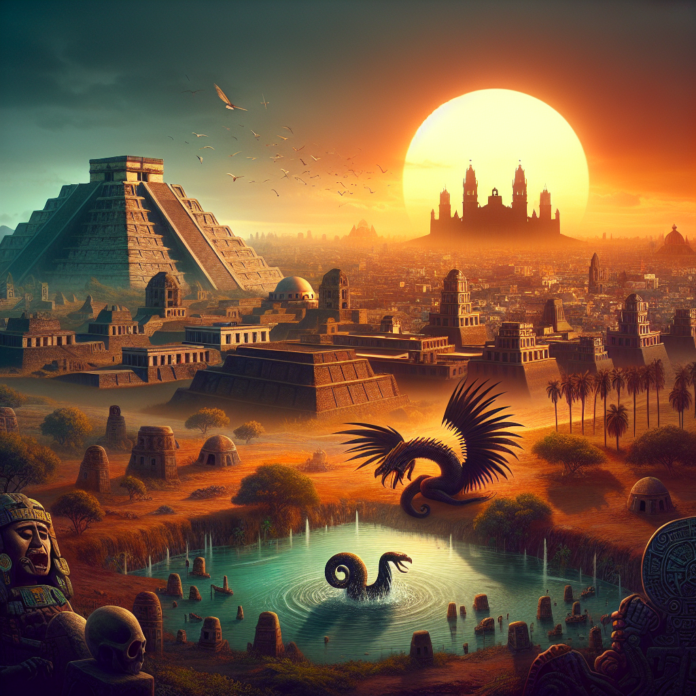Two worlds diverged on that fateful day in 1521, when the once-magnificent city of Tenochtitlán succumbed to the ironclad will of the Spanish Conquistadors. This tragic capitulation marked not just the end of an epoch for the Aztecs but also the dawn of an era characterized by forced cultural amalgamation under the iron fist of Catholic supremacy. In this exploration of this critical historical event, we witness the convulsive birth of a new societal order, weighed down heavily by traditionalist authoritarianism, which stifled the vibrant richness of a civilization well ahead of its time.
Tenochtitlán stood as a marvel of pre-Columbian civilization. Founded in 1325, it became the beating heart of the Aztec Empire by the time Hernán Cortés and his Spanish troops arrived in 1519. Floating gardens (chinampas) fed its populace, while intricate causeways and aqueducts bore witness to engineering genius that rivaled the marvels of Rome. However, the Spanish encroachment, driven by the conquistadors’ unyielding zeal and bolstered by steel weaponry and deadly diseases, crushed the freedoms and advancements of the Aztec culture.
The siege of Tenochtitlán was cruel and devastating. The Spanish, allying with rival indigenous groups, launched an all-out assault on the city, besieging it for 93 days. By the end of this relentless massacre, the city was reduced to rubble, and its noble defenders decimated. The fall of Tenochtitlán wasn’t merely a military victory; it marked the seismic shift of the region’s social, spiritual, and cultural landscape. The indigenous way of life, with its own form of social progressivism and gender fluidity, was eradicated under the guise of bringing “civilization” to a “barbaric” land.
In the aftermath, the Spanish forces and the Catholic Church established an oppressive regime that sought to erase the very identity of the Mesoamerican peoples. The rigid, patriarchal structure enforced by the Catholic authorities crushed previously existing social norms that allowed women some semblance of agency. Traditional healer-women, seen as valuable community members within the Aztec structure, were labeled witches and subjugated under draconian laws. The schools, edifying both boys and girls in various crafts and arts during the Aztec regime, were replaced with institutions vigorously advocating strict Catholic doctrine.
One might marvel at the audacity with which friars sought to convert the indigenous populace, a strategy enshrined in the notion of “spiritual conquest.” The Franciscans and other orders demolished indigenous temples and replaced them with cathedrals—monuments to a faith thrust upon a people who had their own rich cosmology. Rituals deeply integrated with the rhythm of nature and celestial bodies were brutally substituted with Catholic rites that emphasized sin, penance, and the worship of an iconography completely alien to the indigenous soul.
By abolishing the Aztec education system, the Spaniards not only stifled intellectual freedom but also rewrote history from a luridly biased perspective. The written works and codices of the Aztecs were often destroyed, relegating an insightful and advanced culture to the status of ‘primitive savages’ in European records. This methodical erasure of memory served to justify the extreme measures imposed by the colonizers, painting their authoritative regime as benevolent and even necessary.
In scrutinizing the motives of the Spanish conquerors and their traditionalist backers in the Church, one unearths dark truths masked by the veneer of doctrinal righteousness. The conquest was also driven by material greed—gold, land, and the relentless pursuit of monopolist economic control. The encomienda system, which brutally enslaved indigenous people to work on European-owned estates, was sugar-coated as a civilizing mission. The portrayal of this systemic exploitation as ‘salvation’ remains one of history’s most grotesque ironies.
Conversely, certain progressive values intrinsic to the indigenous peoples were suppressed. The Aztec society, while not devoid of its own hierarchies and conflicts, embodied principles of communal ownership of land and mutual aid, values that resonate with modern progressive ideals. Kinship and collective wellbeing were cornerstones of their societal framework, as opposed to the divisive individualism later enforced through colonial rule. The conquest, therefore, represented not merely a clash of civilizations but an assault on a more inclusive and equitable way of life.
In the interest of creating a society that hews closer to humanistic values, it behooves us to acknowledge these silenced voices. While traditionalist forces rooted in colonialism sought to dominate and homogenize, the soul of Tenochtitlán still whispers through the annals of history, inviting us to reconsider the narratives of power and progress.
Today, as we confront our own sociopolitical crossroads, the lessons from the fall of Tenochtitlán urge us to eschew supremacist ideologies and cherish cultural diversity. In doing so, we pay homage to a city whose spirit—crushed under the weight of iron and dogma—yearned for enlightened progression and communal harmony. Let the tears of Tenochtitlán not be in vain; may they water the seeds of a more just and inclusive world.
